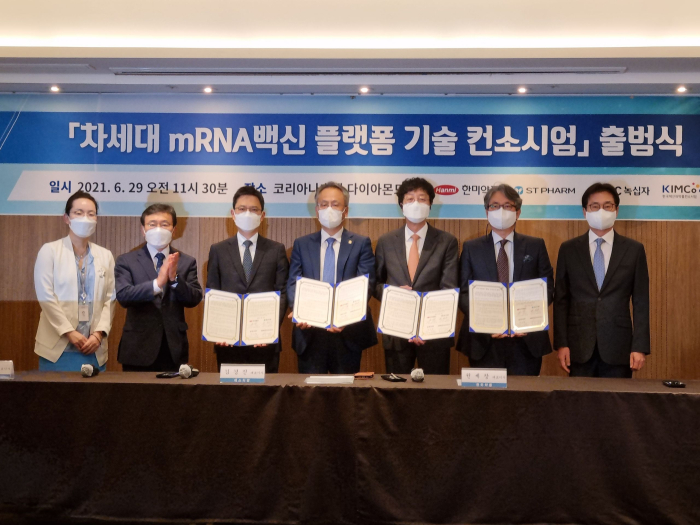South Korea will develop its own messenger ribonucleic acid (mRNA) vaccines by next year with plans to annually manufacture 100 million doses from 2023.
The country’s health ministry and the representative industry association, Korea Pharmaceutical and Bio-Pharma Manufacturers Association (KPBMA), said on June 29 that a consortium had been formed to create a next-generation mRNA vaccine platform.
The consortium, made up of Hanmi Pharmaceutical Co., ST Pharm Co. and Green Cross Corporation, will invest a total of 700 billion won ($618 million) on clinical trials, development of raw materials and expansion of vaccine manufacturing facilities.
According to plans, the consortium will kick off phase I clinical trial around November this year and complete phase II clinical trial by May next year. It will then file for emergency use authorization (EUA) to the Ministry of Food and Drug Safety (MFDS) in June.
EUA allows unapproved drug materials in an urgent need to be produced, distributed and used for a limited time without usual pre-market approval.
Each of the three firms will be responsible for different parts of the mRNA vaccine development and manufacturing processes.
Hanmi will be producing the vaccine’s raw materials, namely plasmid DNA and enzymes, which ST Pharm will synthesize with a vaccine candidate to make an mRNA vaccine compound. ST Pharm has selected its final vaccine candidate on June 29 among a list of 22 materials that it had been testing.
ST Pharm will also be in charge of removing the impurities in enzymes and mRNA molecules, as well as wrapping the synthesized mRNA molecules with lipid nanoparticles (LNP), a process necessary in delivering the mRNA safely to our body cells.
In May, ST Pharm signed a technology transfer deal with Genevant Sciences to purchase the Swiss biotech firm’s LNP technology at 150 billion won ($132.5 million). Genevant’s LNP technology is also used by Moderna and Pfizer in making their mRNA vaccines.
Green Cross, whose facilities in Korea are large enough to make 1 billion doses of finished drugs a year, will be responsible for aseptic filling and packaging of the mRNA vaccines.
Write to Woo-sub Kim at
duter@hankyung.comDaniel Cho edited this article.



